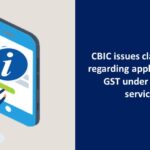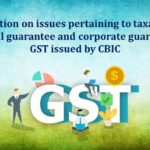Central Board of Indirect Taxes and Customs (CBIC) has issued Circular No. 1072/5/2019-CX dated 25th September, 2019 to further clarify certain issues under Sabka Vishwas (Legacy Dispute Resolution) Scheme, 2019.
Key Points of the Circular are:
- Section 125(1)(a) excludes cases which are under appeal and where final hearing has taken place on or before 30th June, 2019 from the purview of the Scheme. Similar exclusion has been made applicable, mutatis mutandis, under Section 125(1)(c) to cases under adjudication. It is clarified that such cases, however, may still fall under the arrears category once the appellate or adjudication order, as the case may be, is passed and has attained finality or appeal period is over, and other requirements under the Scheme are fulfilled.
- Section 121(c) defines an amount in arrears as the amount of duty which is recoverable as arrears of duty. Further, Section 123 defines ‘tax dues’ in respect of arrears as the amount which is due in arrears. In other words, tax dues are the amount of duty which is outstanding against the declarant. This is the net amount after deducting the dues that he has already paid. Such payment may be in the form of pre-deposits appropriated or paid subsequently by the taxpayer voluntarily against the outstanding amount. It is clarified that the relief available under Section 124(1)(c) will be applied to the net outstanding amount.
- Persons who are eligible in terms of Section 125 can file a declaration under the Scheme. The system automatically shall disallow persons who are not eligible from filing a declaration. However, there is a possibility that such ineligible persons may still make a declaration by selecting an incorrect response. For instance, under Sr. No. 8.1 of Form SVLDRS-1, the person making a declaration has to indicate whether he/she has been convicted for an offence for the matter for which the declaration is being made. If, the answer is ‘Yes’, then the person is ineligible and is not allowed to proceed further by the system. However, such person is able to file a declaration if he/she incorrectly indicates ‘No’ as the answer even though he/she has been convicted. Such declarations are void and do not merit consideration under the Scheme. Such persons may be informed of their ineligibility through a letter.
- One of the category of cases for which a declaration can be made under the Scheme is where the declarant has filed a return but not paid duty. It is possible that a taxpayer may not have paid duty in case of multiple returns. It may be noted that Rule 3 of the Sabka Vishwas (Legacy Dispute Resolution) Scheme Rules, 2019 provides that a separate declaration shall be filed for each case. Further, in terms of the Explanation to Rule 3, in case of arrears, a case means ‘an amount in arrears’. Section 121(c)(iii) defines an “amount in arrears” as the duty recoverable on account of the declarant having filed a return but not paying duty. Since the amount in arrears pertains to a return, a separate declaration will need to be filed for each such return.
- It may so happen that on being pointed out by audit etc, the taxpayer may in some cases deposit the duty without interest. In such cases, a show cause notice is generally issued for appropriating the duty deposited and demanding the applicable interest. It is clarified that such cases are covered under the Scheme.
- Section 121(c) (i) and (ii) define “an amount in arrears” as the amount of duty which is recoverable, inter alia, on account of no appeal having been filed by the declarant against an order or order in appeal before the expiry of the period of time for filing of appeal or the order in appeal having attained finality. There may be situations where the taxpayer does not want to file an appeal even though the time period for filing of appeal is not over. It is clarified that in such cases, the taxpayer can file a declaration under the Scheme provided he gives in writing to the department that he will not file an appeal. This declaration shall be binding on the taxpayer.
For further details please refer the attached document.
Source: Central Board of Indirect Taxes & Customs




